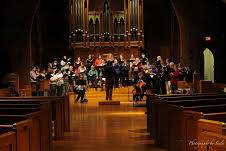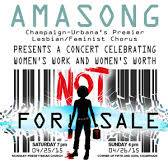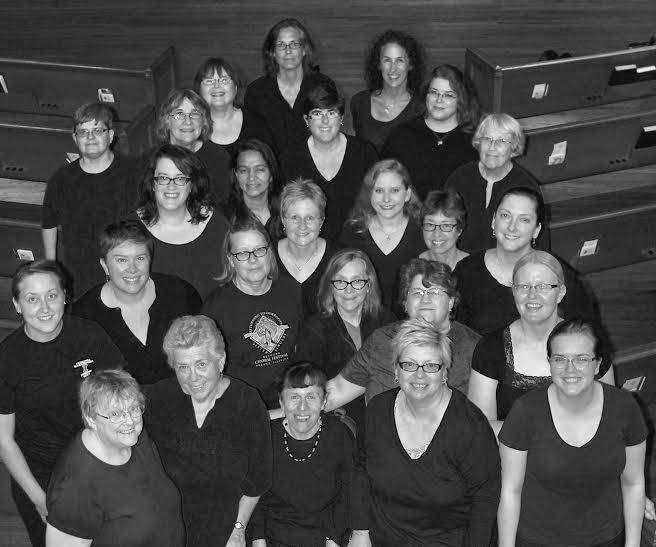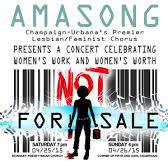 Since I was in elementary school, I have loved anything that was music related. Choir, band, Hannah Montana, you name it, I was on it. So the opportunity to learn more about Amasong, Champaign-Urbana’s premier Lesbian/Feminist choir, was certainly not one that I could pass up. Founded by Kristina Boerger in 1990 while pursuing her Master’s degree in choral conducting at U of I, Amasong was created to provide a welcoming and creative space for all women, an ideal that has been maintained throughout the past two and a half decades. I sat down with director Jill Crandall and members Beth Wohlgemuth and Jan Troutt to discuss the purpose of Amasong, and how it strives to continue to be a safe space for women today as it was 25 years ago.
Since I was in elementary school, I have loved anything that was music related. Choir, band, Hannah Montana, you name it, I was on it. So the opportunity to learn more about Amasong, Champaign-Urbana’s premier Lesbian/Feminist choir, was certainly not one that I could pass up. Founded by Kristina Boerger in 1990 while pursuing her Master’s degree in choral conducting at U of I, Amasong was created to provide a welcoming and creative space for all women, an ideal that has been maintained throughout the past two and a half decades. I sat down with director Jill Crandall and members Beth Wohlgemuth and Jan Troutt to discuss the purpose of Amasong, and how it strives to continue to be a safe space for women today as it was 25 years ago.
Smile Politely: Amasong has quite an interesting background and history, could you tell me some more about it?
Amasong: Well when it started there was really nothing quite like it in the area. There was no supportive group for women, and especially not one for feminist or lesbian women. Kristina wanted a group that could provide that sort of support, and it began more or less as a rag-tag effort, but it caught on and just continued to grow. The slash between the Lesbian/Feminist is very important because it means either/or. For Amasong it goes along with trying not to exclude anyone, but it does let people know what they’re getting into if they’re interested in joining.
SP: How has Amasong changed since it first began to today?
Amasong: It changes with the directors, but the core intent of Amasong always stays the same. The music and programming will shift with each new director and as different members come in and out, but what Amasong is about is always consistent. With Jill, our current director, her style is of course different to previous directors, but one reason why Amasong’s message stays the same from director to director is because whenever we interview potential directors we try to make it very clear that Amasong is a group for women and about women, and their music selection should reflect that as much as possible.

SP: What is one of the most memorable events Amasong has been a part of?
Amasong: Over the summer of 2014 we hosted a festival called Sister Singers that is held every four years, and we were fortunate enough to host them at Krannert Center. It was spectacular there were fourteen choruses, including Amasong, and all together there were probably about 400 women who attended the festival. Throughout the entire festival many different workshops were held, all of them either life, women, or music-focused, but each one with the intent to bring women together and uplift them; with everyone together the energy was incredible, it was life-changing for many of us.
SP: How does Amasong operate/serve in the Champaign-Urbana community?
Amasong: We’ve performed at many different venues in the community, most notably in September 2014 when we sang at the first Gay Pride Parade held in Champaign-Urbana, as well as the 2014 Folk and Roots Festival. Both were really fun and what we liked the most was just being able to be apart and support those types of groups that work hard to make welcoming and accepting spaces. Also, before Illinois passed the Marriage Law a group of us went down to the Supreme Court where rallies were being held, and we sang with a Chicago’s Women’s Chorus that is also apart of Sister Singers. What we most want Amasong to be for people in the community is a safe and creative space for women of all backgrounds, ages and experiences to come meet each other and celebrate women’s music. What’s really cool is sometimes a few members will together, or with the director, do their own arranging or composing, so it provides an open creative space for members to develop their own style of music. We always make an effort to support people, especially women, who are trying to make a living selling music because of the difficulties many people face to get their music produced.
SP: How would you describe Amasong’s style of music choice?
Amasong: Our music is not at all like typical choir music. Some of the pieces might be ‘easy’, but not in a way that someone might be used to. If a member is used to singing Bach and Brahms, which are wonderful, it might be a bit of an adjustment for them to be singing African or Chinese music. A lot of our pieces are multi-language and many times we’ll put the music down and move around, which is not typical of most choirs. However our auditions are not too difficult at all; we don’t require people to have pre-choral experience to audition because we’ll help them learn what they need during rehearsals, they just have to have the desire to be a part of Amasong and create music.
SP: How many performances a year does Amasong have?
Amasong: We have four concerts a year, so two per semester. This year we’re focusing on the state of women in the world, how far we’ve come but also how far we still need to go in terms of improving the conditions and equality of women world-wide. Our spring concert, which will be held from April 25th-26th at the Mckinley Presbyterian Church, is called “Not for Sale: A Concert Celebrating Women’s Worth and Women’s Work”. Our normal performance space is at Mckinley Presbyterian Church, but we’ve also sang at the Urbana Children’s Library and the YMCA on campus.

Amasong’s spring concert, Not for Sale: A Concert Celebrating Women’s Worth and Work, will be held April 25th at 7 p.m. and April 26th at 4 p.m. at Mckinley Presbyterian Church.
Photos obtained from Amasong used with permission.








